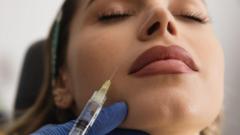Are New Regulations Tightening Botox, Filler, and BBL Treatments?

Government's New Regulations on Cosmetic Procedures: A Step Towards Safety
The cosmetic industry has seen a rapid growth in popularity, leading to a surge in non-surgical procedures like Botox, lip fillers, and the controversial Brazilian Butt Lift (BBL). However, this boom has not come without significant risks. In light of alarming incidents, including serious complications and even fatalities, the government has announced comprehensive plans to regulate these procedures. The aim? To protect consumers from unqualified practitioners and ensure safer practices within the industry.
Understanding the Need for Regulation
The rise of the non-surgical cosmetic industry has been likened to a "Wild West," where anyone can claim to be a practitioner without necessary qualifications. This lack of oversight has resulted in numerous complications for patients, including painful procedures, permanent scarring, and even tragic outcomes. The most notable case was that of Alice Webb, who tragically lost her life after undergoing an unregulated BBL in September 2024. Such incidents have highlighted the urgent need for regulatory measures.
Key Features of the Proposed Regulations
Under the new proposals, only qualified health professionals will be authorized to conduct high-risk non-surgical procedures, such as Brazilian Butt Lifts and breast fillers. This marks a significant shift in the industry, where anyone could previously perform these procedures with little to no training.
- Qualified Practitioners Only: Only health professionals with specific training and qualifications will be allowed to perform certain high-risk procedures.
- Licensing Requirements: Clinics will need to meet stringent licensing requirements that include safety, training, and insurance standards.
- Age Restrictions: Individuals under 18 will be protected from potentially hazardous beauty treatments that are popularized through social media.
Addressing the Industry's Concerns
The proposed regulations have received a warm welcome from industry professionals and organizations, including the Joint Council for Cosmetic Practitioners (JCCP). They argue that ensuring all cosmetic practitioners are regulated and licensed is imperative for public safety. Prof David Sines, executive chair of the JCCP, expressed strong support for the government's plans, emphasizing the need for safe practices within the industry.
The Role of Public Consultation
Before any regulations can be implemented, the government plans to conduct further consultations to determine how these measures will work in practice. A public consultation in 2023 showed widespread support for tighter regulations, indicating that the public is increasingly concerned about safety in the cosmetic industry.
Impact on Consumers and Practitioners
While the government stresses that these regulations are not designed to prevent individuals from seeking cosmetic treatments, they aim to root out unqualified practitioners who endanger public safety. Health Minister Karin Smyth stated, "This isn't about stopping anyone from getting treatments. It's about preventing rogue operators from exploiting people at the expense of their safety." This sentiment reflects a broader movement towards safeguarding the welfare of consumers in an industry often viewed as unregulated.
Training and Safety Standards for Practitioners
As part of the proposed regulations, practitioners will need to undergo appropriate training and meet specific safety standards before being allowed to perform procedures. This move is expected to elevate the overall quality and safety of cosmetic treatments available to consumers. With the right training, practitioners can better manage the risks associated with high-risk procedures, ultimately protecting patients from potential harm.
Balancing Consumer Choice and Safety
One of the critical challenges in implementing these regulations will be balancing consumer choice with safety. While many individuals seek cosmetic treatments for personal reasons, the government aims to ensure that the options available are safe and performed by qualified professionals. By doing so, they hope to reduce the incidence of botched procedures that place unnecessary strain on healthcare services, including the NHS.
The Future of Non-Surgical Cosmetic Procedures
As the cosmetic industry continues to evolve, the need for regulation will become increasingly important. The government's proposals signal a proactive approach to addressing the significant risks associated with non-surgical procedures while also promoting ethical practices within the industry. With an estimated 16,000 businesses involved in non-surgical cosmetic procedures, this regulatory framework could potentially reshape the landscape of cosmetic treatments in the UK.
What This Means for Consumers
For individuals considering cosmetic procedures, these regulations will provide a safer environment. Consumers will have the reassurance that only qualified practitioners are allowed to perform high-risk treatments, reducing the chances of encountering unqualified operators. It is essential for potential patients to remain vigilant and ensure they are seeking treatments from licensed and insured professionals.
Frequently Asked Questions
What procedures will be regulated under the new proposals?
The government plans to regulate high-risk procedures such as Brazilian Butt Lifts and breast fillers, requiring only qualified health professionals to perform them.
Will the age restrictions apply to all cosmetic procedures?
Yes, individuals under 18 will face restrictions on certain procedures, particularly those heavily promoted on social media.
When will these regulations come into effect?
It could take several years before the proposed measures are fully implemented, as they must go through further public consultations and parliamentary approval.
How can consumers ensure their safety when seeking cosmetic treatments?
Consumers should verify that practitioners are registered, qualified, and work from licensed premises. It’s essential to ask about safety standards and training before proceeding with any treatment.
What happens if a practitioner does not comply with the new regulations?
Non-compliance with the regulations may result in penalties, including the revocation of licenses and potential legal action against practitioners who endanger public safety.
As the government takes steps to regulate the cosmetic industry, it is crucial for consumers to stay informed and prioritize their safety. The future of non-surgical cosmetic procedures will likely see increased accountability and professionalism, benefiting both patients and ethical practitioners alike. How do you feel about the new regulations in the cosmetic industry? Will they change your perspective on cosmetic treatments? #CosmeticSafety #Regulations #HealthAndBeauty
Published: 2025-08-07 00:35:18 | Category: technology



